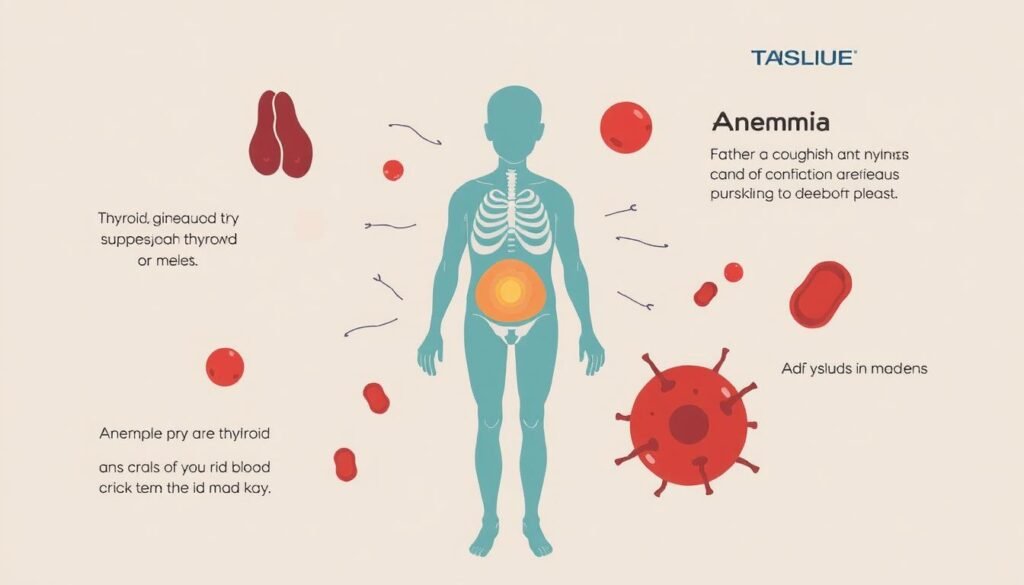Did you know nearly 40% of adults in the United States are affected by chronic fatigue? This makes productivity and overall well-being suffer. A heavy feeling in the body is common but can come from many sources. These can be medical conditions or even the choices we make every day. Learning about the causes of fatigue is key for those feeling tired all the time. It helps them find ways to feel lighter.
This piece will explore why you might feel unusually heavy. We will look at your diet, sleep, and mental health. The goal is to help you see what might be draining your energy. From there, you can find ways to bring back your vitality and feel lighter in your daily life.
Key Takeaways
- Chronic fatigue can significantly disrupt daily activities.
- Physiologic fatigue often arises from lifestyle factors like diet and sleep.
- Understanding underlying health conditions is key to diagnosing secondary fatigue.
- Women are particularly impacted by anemia and depression, leading to fatigue.
- Post-acute syndrome after COVID-19 may include lingering tiredness.
Understanding the Sensation of a Heavy Body
Feeling like your body is heavy is common. It’s often just tiredness making daily tasks hard. People find their limbs or chest feel especially heavy, suggesting a deeper problem.
Knowing what fatigue really means is key. It can come from many places. Things like stress and sadness make us feel even more tired. Bad eating, not moving enough, and not drinking water add to this feeling of being slow.
Certain health issues, such as hypothyroidism, are directly linked to feeling heavy because they affect our energy. Keeping a healthy lifestyle by eating well and exercising can help fight this. For more details on what causes this, you can click here.
Common Causes of Lethargy and Muscle Weakness
Lethargy and muscle weakness can make daily life hard. They often point to health problems that need attention. These issues can come from many sources, such as how we live and chronic diseases that lower our energy.
Fatigue: More than Just Tiredness
Fatigue is more than feeling tired; it’s a constant lack of energy that affects everything we do. A big reason for this might be not moving enough, which leads to weaker muscles. Muscle strength usually starts to drop after our 20s and 30s because of less activity, getting older, and certain illnesses.
- An inactive life majorly affects muscle strength.
- Diseases like diabetes and anemia can make tiredness worse.
- Some drugs also add to feeling more tired.
Chronic Illness and Its Impact on Energy Levels
Long-lasting sicknesses are a big reason why many feel tired all the time. Diseases like fibromyalgia and chronic lung issues often go hand in hand with unending tiredness, making a tough cycle of feeling weak. Mental health can also affect how our body feels, with issues like anxiety and depression draining our energy.
Muscle weakness due to chronic illness includes:
| Chronic Illness | Impact on Muscle Strength |
|---|---|
| Anemia | Fewer red blood cells make you feel weak and tired. |
| Diabetes | It can lead to muscle weakness through nerve damage. |
| Fibromyalgia | Constant pain keeps you feeling tired. |
| Hypothyroidism | Not enough hormones cause fatigue. |
| Chronic lung disease | Not getting enough oxygen makes muscles weaker. |
The Role of Poor Diet in Feeling Heavy
A poor diet is a major reason we feel heavy or tired. Not eating right can lead to a lack of energy and discomfort. We will look into how missing important nutrients can harm our health. Also, we’ll see why eating too much processed food is bad.
How Nutritional Deficiencies Affect Your Body
Not getting enough vitamins and minerals, like iron and vitamin B12, can make you tired. These nutrients are key for carrying oxygen and creating energy. If you don’t get enough, you might feel weak, tired, and heavy all the time. Here is a table that shows some important nutrients and what happens if you don’t get enough:
| Nutrient | Common Deficiency Symptoms | Sources |
|---|---|---|
| Iron | Fatigue, weakness, pallor | Lean meats, beans, spinach |
| Vitamin B12 | Fatigue, cognitive difficulties, nerve issues | Meat, dairy products, fortified cereals |
| Vitamin D | Fatigue, depression, muscle weakness | Sun exposure, fatty fish, fortified milk |
Ultra-Processed Foods and Their Effects
Eating too much processed food is bad for our diet. It can cause more inflammation and lack of nutrients. These foods have a lot of sugar and bad fats. This can hurt our mind and energy levels. Eating lots of refined carbs, like in processed foods, can make your energy go up and down fast. This can make you feel even more tired.
Medical Conditions Leading to Your Body Feels Heavy
Many people feel a heaviness in their bodies because of different medical issues. Figuring out what these problems are can make a big difference in how good we feel. Two common issues are thyroid problems and anemia. Knowing about these conditions helps us deal with them better.
Thyroid Conditions and Metabolic Health
Hypothyroidism is a thyroid problem that affects our metabolism. If the thyroid gland doesn’t produce enough hormones, our metabolism slows down. This slowing can make us feel tired, gain weight, and generally feel heavy. Feeling less active and having a hard time focusing are common. Getting regular check-ups and blood tests can find thyroid problems early. This means they can be treated in time to get our metabolism back on track.
Anemia and Iron Deficiency
Anemia, which often comes from not having enough iron, can make you feel really tired. It happens when there aren’t enough red blood cells to carry oxygen around. This can make you feel weak, look pale, and feel dizzy. To treat anemia, you might need to eat differently, take iron pills, or fix the health problems causing it.

| Condition | Symptoms | Treatment Options |
|---|---|---|
| Thyroid Issues | Fatigue, weight gain, depression | Hormone replacement therapy, dietary adjustments |
| Anemia | Weakness, pallor, dizziness | Iron supplements, dietary changes, addressing underlying causes |
Sleep Disorders and Their Effects on Energy
Sleep disorders are key in determining our energy levels. Good sleep is crucial, not just luxury. It’s vital for our health and happiness. Poor sleep can make us feel tired all day.
Understanding how sleep affects us shows why disorders hurt our daily activities.
How Poor Sleep Quality Contributes to Heaviness
Poor sleep can make us feel tired and heavy. Adults need 7 to 8 hours of sleep to stay sharp. Things like too much coffee, changing routines, and getting older can mess up our sleep.
This leads to sleep disorders and feeling worn out during the day. Sleeping problems include:
- Difficulty falling asleep
- Waking up often at night
- Feeling very sleepy during the day
- Snoring loudly
- Feeling tingles in legs or arms
- Sudden muscle weakness
About 50 to 70 million Americans struggle with sleep disorders. This shows how important sleep is to avoiding feeling sluggish.
Sleep Apnea and Its Symptoms
Sleep apnea is a serious sleep disorder. It affects how you breathe when sleeping. It can make you snore or gasp, waking up often. This ruins your sleep and makes you feel more tired.
Sleep studies are needed to diagnose sleep apnea. Using CPAP machines and changing some daily habits can help. This can make you feel less heavy and more energetic.
| Sleep Disorder | Common Symptoms | Treatment Options |
|---|---|---|
| Insomnia | Difficult falling/staying asleep | Good sleep habits, cognitive behavioral therapy |
| Sleep Apnea | Snoring, gasping for air | CPAP machines, lifestyle changes |
| Restless Legs Syndrome | Tingling sensations, urge to move | Medications, natural products like melatonin |
The Connection Between Mental Health and Fatigue
Mental health affects how we feel and act every day. It links closely with energy levels and how our bodies feel. When people have mental health issues like depression and anxiety, they often feel very tired. This tiredness can be hard to shake off. It’s important to see how these mental health problems and feeling worn out are connected. This helps us find good ways to deal with them.
Depression: Symptoms Beyond Sadness
Depression is more than just being sad. People with depression might feel too tired to do anything. This can lead to not caring about things and feeling very tired all the time. They might find it hard to focus, get irritated easily, and feel pain. Depression shows us how our minds and bodies work together. If you’re feeling this way, getting help is key. This support can make both your mind and body feel better.
Anxiety: Its Role in Chronic Fatigue
Anxiety plays a big part in feeling continually tired. Worrying all the time boosts stress hormones, messing with sleep and how our body uses food. This can make us feel mentally wiped out, irritable, unfocused, and can lead to headaches. Knowing how anxiety affects you is the first step to getting better. Relaxation methods like yoga or meditation help. They work towards balancing our mental health and physical energy.

The Impact of Sedentary Lifestyle on Energy
A sedentary lifestyle means sitting or lying down for six or more hours a day. This habit can lower energy levels, making you feel tired and heavy. It happens because not moving much slows down your blood flow and makes your muscles weak.
Only 20% of people do enough exercise. Not moving enough means not burning many calories, which can lead to weight gain. With more weight, diseases like insulin resistance and Type 2 diabetes become bigger risks.
Being inactive can also increase the chance of heart diseases like cardiomyopathy. Mental health suffers too. Less exercise means less serotonin, which can cause more stress and sadness. Yet, simple things like moving more during the day can boost your energy. Regular exercise is key to fighting the downsides of staying still too much.
To learn how lifestyle changes can boost your energy, check out healthy lifestyle choices. This will help you beat inactivity and improve your overall health.
Strategies to Combat a Heavy Feeling in the Body
Many people feel heavy, especially as they get older. There are good ways to deal with this. Adding exercise to your day and changing what you eat can make you feel more energetic and healthier.
Incorporating Regular Exercise into Your Routine
Exercise is key to fighting off that heavy feeling. It makes you more energetic and lifts your mood. Try aerobic activities like fast walking or swimming for better blood flow and more energy. You should exercise for at least 2 hours and 30 minutes each week if you’re between 19 and 64.
Yoga is great for boosting energy and making your mind clear. A study in Britain showed yoga attendees felt more confident and energetic after just six weeks of classes.
Improving Your Diet for Better Energy
What you eat is very important for fighting tiredness and boosting energy. Eating whole foods and having regular meals or healthy snacks every 3 to 4 hours keep your energy up. Foods rich in omega-3, like fatty fish, help your mind stay sharp.
It’s also important to drink plenty of water. Even getting a little dehydrated can make you tired. For tips on what to eat for more energy, check out essential nutrients for energy.
| Strategy | Benefits |
|---|---|
| Regular Exercise | Boosts energy and mood; reduces feelings of heaviness |
| Yoga | Enhances clarity and confidence; improves energy levels |
| Balanced Diet | Maintains stable energy levels; supports overall health |
| Hydration | Improves physical performance; combats fatigue |
| Regular Sleep | Enhances overall vigor; reduces daytime fatigue |
Hydration and Its Importance for Your Body
Hydration is crucial for our health. About 75% of Americans don’t drink enough water. This lack leads to tiredness and poor health. If you feel heavy or tired, it may be because you’re not drinking enough water. Drinking plenty of water helps our body work well. It keeps our blood pressure in check and fights off tiredness.
Studies show that 28% of older adults don’t drink enough water. For those trying to lose weight, water can help. Replacing sugary drinks with water can lead to a loss of 5% body weight. Women who drank water before meals also lost weight and body fat.
Drinking enough water does more than help you lose weight. It keeps your joints healthy because cartilage is mostly water. It also reduces the risk of kidney stones and eases symptoms like thirst and tiredness. Even slight dehydration can cause headaches, as it may cause the brain to shrink a bit.
Men should drink about 13 cups (3 liters) of water a day. Women need about 9 cups (just over 2 liters). Pregnant and breastfeeding women need more, about 10 to 12 cups. Kids and teens should have between 6 to 8 cups daily.
For those who find water boring, try adding fruits or herbs. This can make water tastier and help you drink more. It’s important to keep drinking water to stay energized and avoid feeling sluggish.
Tips for Managing Stress and Anxiety
It’s crucial to manage stress and anxiety for better health. Effective stress management methods can make you feel lighter. They positively affect both your mind and body.
Mindfulness, like meditation, really helps with anxiety relief. It makes symptoms less severe. This brings a peaceful, calm feeling.
Here are some practical tips for mental wellness:
- Engage in regular aerobic exercise, which has been shown to lower perceived stress levels.
- Maintain a balanced diet, steering clear of ultra-processed foods that can elevate stress levels.
- Limit smartphone use to reduce exposure to stress-inducing digital content.
- Seek social support from friends and family to create a strong coping network.
- Practice yoga regularly, which has been linked to lower anxiety and stress levels.
- Establish a consistent sleep routine to enhance relaxation and overall mental health.
Dealing with procrastination is another big step in stress management. Completing tasks on time reduces stress. This helps you focus better and be more productive.
Journaling is also a good way to cope. Writing down what you feel and experience helps process your emotions. It leads to a more positive outlook and anxiety relief.
Staying proactive about your mental wellness is key. If stress is too much, get professional help. Psychotherapy and medication are effective for treating anxiety. The right support can really improve your life.

| Stress Management Technique | Benefits |
|---|---|
| Aerobic Exercise | Reduces perceived stress and enhances mood. |
| Mindfulness Practices | Decreases symptoms of anxiety and stress. |
| Social Support | Provides emotional comfort and lower stress levels. |
| Yoga | Improves psychological well-being and reduces anxiety. |
| Healthy Eating | Prevents mood swings associated with diet-induced stress. |
| Journaling | Facilitates emotional expression and mental clarity. |
Using these tips for mental wellness in everyday life can lead to a balanced, more peaceful life. They help fight the stress and anxiety that weigh us down.
Conclusion
The final thoughts on heaviness show how diet, sleep, and mental health are all connected. Many things cause fatigue, such as lifestyle and health issues. About 1 in 3 people in the U.S. don’t get enough sleep. So, aiming for better body health is key to feeling well overall.
Experts suggest keeping a sleep diary and getting medical help if tiredness doesn’t go away. Chronic pain and sleep problems can make fatigue worse. By eating right, exercising, and practicing mindfulness, you can boost your energy and beat tiredness.
Choosing a whole-body approach to health boosts your energy and makes you feel lighter. For deeper understanding, check out this informative source. Start your path to a healthier, more vibrant life today.